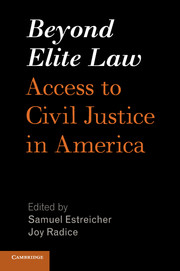Book contents
- Frontmatter
- Contents
- Beyond Elite Law
- Foreword
- List of Contributors
- Overview
- Overview
- PART I CURRENT STATE OF ACCESS TO LEGAL SERVICES
- PART II SOURCES OF LEGAL SERVICES ASSISTANCE FOR WORKING AMERICANS
- PART III FASHIONING A REFORM AGENDA
- 23 New York State Task Force to Expand Access to Civil Legal Services
- 24 New York's 50-hour Pro Bono Requirement
- 25 Starting a “Low Bono” Law Practice
- 26 Toward a More Effective and Accessible Solo and Small Firm Practice Model
- 27 Facilitating Homemade Wills
- 28 Court Facilitation of Self-Representation
- 29 Limited Representation and Ethical Challenges
- 30 Technology Can Solve Much of America's Access to Justice Problem, If We Let It
- 31 Mediation of Employment Disputes at the EEOC
- 32 AAA Consumer Arbitration
- 33 Saturns for Rickshaws: Lessons for Consumer Arbitration and Access to Justice
- 34 Employment Arbitration in the Securities Industry
- 35 FINRA Arbitration and Employment Disputes
- 36 Arbitration as an Employee-Friendly Forum
- 37 Access to Justice in Employment Arbitration: a Critical Look
- 38 Collaborative Technology Improves Access to Justice
- 39 Union Representation in Employment Arbitration
- 40 Legal Representation for New York City's Chinese Immigrant Workers
- 41 Reassessing Unauthorized Practice of Law Rules
- 42 The Pyett Protocol: Collectively-Bargained Grievance Arbitration as a Forum for Individual Statutory Employment Claims
- PART IV CREATING A CULTURE OF SERVICE
- Index
29 - Limited Representation and Ethical Challenges
from PART III - FASHIONING A REFORM AGENDA
Published online by Cambridge University Press: 05 May 2016
- Frontmatter
- Contents
- Beyond Elite Law
- Foreword
- List of Contributors
- Overview
- Overview
- PART I CURRENT STATE OF ACCESS TO LEGAL SERVICES
- PART II SOURCES OF LEGAL SERVICES ASSISTANCE FOR WORKING AMERICANS
- PART III FASHIONING A REFORM AGENDA
- 23 New York State Task Force to Expand Access to Civil Legal Services
- 24 New York's 50-hour Pro Bono Requirement
- 25 Starting a “Low Bono” Law Practice
- 26 Toward a More Effective and Accessible Solo and Small Firm Practice Model
- 27 Facilitating Homemade Wills
- 28 Court Facilitation of Self-Representation
- 29 Limited Representation and Ethical Challenges
- 30 Technology Can Solve Much of America's Access to Justice Problem, If We Let It
- 31 Mediation of Employment Disputes at the EEOC
- 32 AAA Consumer Arbitration
- 33 Saturns for Rickshaws: Lessons for Consumer Arbitration and Access to Justice
- 34 Employment Arbitration in the Securities Industry
- 35 FINRA Arbitration and Employment Disputes
- 36 Arbitration as an Employee-Friendly Forum
- 37 Access to Justice in Employment Arbitration: a Critical Look
- 38 Collaborative Technology Improves Access to Justice
- 39 Union Representation in Employment Arbitration
- 40 Legal Representation for New York City's Chinese Immigrant Workers
- 41 Reassessing Unauthorized Practice of Law Rules
- 42 The Pyett Protocol: Collectively-Bargained Grievance Arbitration as a Forum for Individual Statutory Employment Claims
- PART IV CREATING A CULTURE OF SERVICE
- Index
Summary
The usual premise of legal representation is that the attorney is to provide a full measure of advice or advocacy appropriate to the needs and resources of the client. The literature on access to justice suggests that a more limited form of representation – sometimes termed “unbundled” legal services – should be encouraged as means of expanding access to legal assistance for Americans of modest means. Unbundling would allow lawyers to offer assistance on discrete tasks, rather than taking on representation over an entire legal matter. Russell Engler in this chapter evaluates the arguments in favor of unbundling in light of research on the effectiveness of limited representation compared to full representation, and the ethical challenges posed in limiting representation to discrete tasks.
The topic of limited representation encompasses ideas captured by a variety of terms, including “unbundled legal services,” “limited scope representation,” “limited assistance representation,” and “limited legal assistance.” The concepts emerged as a partial response to the flood of unrepresented litigants and the unaffordability of lawyers for many potential clients. Representation involves a package of discrete tasks, such as gathering facts and advising the client. “Unbundled legal services is a practice in which the lawyer and client agree that the lawyer will provide some, but not all of the work involved in a traditional full service representation.”
Long before the emergence of the term “unbundling,” legal aid offices, through hotlines and pro se clinics, delivered assistance short of full representation. As assistance programs for the underserved population proliferated, a number of issues emerged for legal aid attorneys, bar associations, and the courts regarding the trend toward unbundling. This chapter briefly explores justifications for the increased use of unbundling as well as emerging questions regarding the effectiveness of unbundling. The chapter then focuses primarily on the ethical issues involved with various forms of unbundling and related issues that arise with the high incidence of self-representation. Given the reality that new forms of assistance will continue to emerge as part of efforts to increase access to justice, the chapter concludes by setting forth a framework for handling ethics questions in these contexts generally.
- Type
- Chapter
- Information
- Beyond Elite LawAccess to Civil Justice in America, pp. 431 - 443Publisher: Cambridge University PressPrint publication year: 2016



